A debate in the Second Chamber Committee yesterday on Kingdom Relations with State Secretaries Zsolt Szabo (BZK) and Jurgen Nobel (SZW) has failed to provide clarity on how the government plans to address the purchasing power decline for minimum-income households in the Caribbean Netherlands.

(Photo DossierKoninkrijksrelaties)
The discussion centered on the report “A Dignified Existence” by the Thode Committee, which prompted increases in the minimum wage and social benefits. However, Member of Parliament Raoul White (GroenLinks-PvdA) highlighted that these gains will be offset starting January 1 due to the government’s decision not to extend the energy allowance for low-income households and subsidies for water and electricity.
State Secretary Szabo reiterated his earlier communication to the House: the allocated €9 million will only be addressed in the spring memorandum. Aukje de Vries (VVD) urged the government to provide clarity to the residents of Bonaire, St. Eustatius, and Saba without delay. However, Szabo insisted on adhering to the regular budget cycle, stating, “You will need to be patient, but the thinking has already begun.”
The debate left committee members with few concrete answers. The government affirmed its commitment to economic development but could not specify how this will be achieved. Similarly, structural reductions in living costs remain undefined. Szabo’s vague responses led a visibly frustrated De Vries to comment that “regurgitating pre-prepared answers” was unhelpful.
The only certainty to emerge from the debate is that the government will not announce measures to address the purchasing power decline—estimated by Nibud to be as much as 10%—until the summer. Meanwhile, the House will vote tomorrow on two amendments proposed by Don Ceder (Christen Unie), aiming to allocate €16 million to prevent poverty traps starting January 1.
 Saba News News and Information from Saba Island, Dutch Caribbean
Saba News News and Information from Saba Island, Dutch Caribbean
